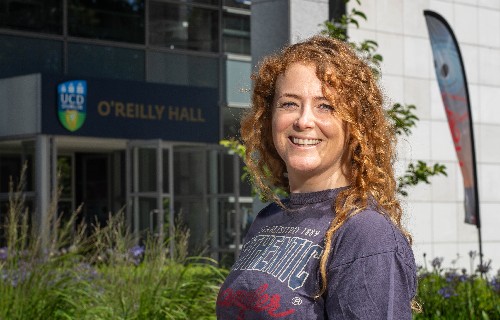One of Europe’s largest ever space missions reported to the International LISA Symposium hosted at UCD the week (7-12 July), giving an overview of the €1.75 billion project which was adopted by the European Space Agency (ESA) in January.
The LISA Mission will build and launch the first ever observatory in space dedicated to studying gravitational waves – ripples in the fabric of space-time emitted during the most powerful events in the universe, such as pairs of black holes colliding and merging. LISA, led by ESA in partnership with NASA, will be the first mission to probe the entire history of the universe using these waves. Construction is due to start next year and it is set to launch in 2035.
 The LISA Mission report formally confirmed Irish scientist Dr Anna Heffernan as a member of the LISA Science Team – a group of 20 top experts selected by ESA to advise during the development and operations of the LISA Mission. Dr Heffernan is a UCD graduate and former PhD researcher of the UCD Relativity Group, chosen as the ‘waveforms’ expert. This field involves solving Einstein's Field Equations (of relativity) and equations of motion to predict what waveforms from different types of systems will look like.
The LISA Mission report formally confirmed Irish scientist Dr Anna Heffernan as a member of the LISA Science Team – a group of 20 top experts selected by ESA to advise during the development and operations of the LISA Mission. Dr Heffernan is a UCD graduate and former PhD researcher of the UCD Relativity Group, chosen as the ‘waveforms’ expert. This field involves solving Einstein's Field Equations (of relativity) and equations of motion to predict what waveforms from different types of systems will look like.
Dr Heffernan said: “This an exciting and very significant project. LISA will open a new window on our universe, there is so much science we can do. I was absolutely delighted to be selected, helping ensure we maximise the return of such a groundbreaking mission is a privilege. I am also delighted to be part of the Irish participation in a major international scientific project.”
Opening the symposium, ESA astrophysicist and Lead Project Scientist of the LISA Mission, Dr Nora Luetzgendorf said: “I’m thrilled to open the LISA Symposium at UCD this morning. It’s very exciting for ESA to adopt this project to look at gravitational waves. For many decades it was just theory, starting from Einstein’s Theory of Relativity, but now we have the technology to really observe these waves, measure them and learn how they can affect us.”
Questions and Answers with Anna
What got you into theoretical physics?
In school, maths and physics were my favourite subjects and theoretical physics combines the two. You get to play with equations while learning how everything works around you.
What's the most exciting thing we can learn from exploring space?
Glimpses into moments after the big bang and how the universe grew to how it is today, aka cosmology, is pretty mind-blowing. We can also look at the universe as a great lab in so many ways, observing extreme gravity and densities, ones that we are incapable of observing or creating on Earth; this can allow insights into fundamental physics, where we still have so much to learn.
Where do you see yourself in 10 years?
Hopefully still in science, exploring interesting questions.
What do you like to do in your spare time?
Many things! Running, hiking, yoga, reading, movies.
If not physics, what alternative career might you have pursued?
Probably one of the other sciences or medicine; I enjoy learning and researching.
What's your biggest aspiration for humanity?
To keep expanding our knowledge both in science and understanding each other. Acceptance both of proven facts and people.
About Dr Anna Heffernan
Anna is a UCD graduate with a BSc in theoretical physics from UCD School of Physics, followed by an MSc in quantum fields in fundamental physics from Imperial College London. She has a PhD in general relativity from UCD where she was also a member of the UCD Relativity Group. She was a post doctorate researcher at the Advanced Concepts Team of ESA's European Space Research and Technology Centre (ESTEC) in the Netherlands, then held post doc roles at the University of Florida, the University of Guelph, Canada, and the University of the Balearic Islands, Spain.
Watch an interview with Anna while she was a Research Fellow at ESA.